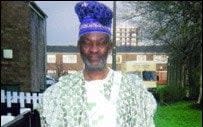Killer becomes first released after changes to joint enterprise law

A former drug addict who was jailed for murder, has become the first person to be released from prison following a change in the way joint enterprise killings are interpreted
John Crilly was given a life sentence for murder and robbery in 2005 after he and associate, David Flynn broke into the home of a 71-year-old man in Manchester.
Flynn attacked the pensioner, Augustine Maduemezia, punching him in the face, and he later died.
But both were convicted of murder under the law of joint enterprise, which is used to prosecute defendants in cases where they may not have struck the fatal blow, but could have foreseen violent acts carried out by their associates.

But two years ago the law came under fresh scrutiny when the Supreme Court ruled that judges had been wrongly interpreting the legislation.
Crilly, who studied law during his 13-years in prison, launched an appeal against his conviction for murder.
He told the BBC he believed he should never have been convicted of murder in the first place.
He said"I wasn't a violent drug addict. I was lost. I was lost in drugs. I had a bad life, I've changed it, but I wasn't guilty of murder. I totally accept what I did and it was wrong. That's important to me. I'm not a murderer."
After launching his appeal, Crilly pleaded guilty to manslaughter and his murder conviction was overturned and he was freed because of time served.

Mr Maduemezia's family said in a statement: "This incident had a devastating effect on the family who took a number of years to come to terms with their father's death.
"You can then imagine their anger and disappointment when they were informed by the police that Mr Crilly had launched a second appeal against his conviction (his first in 2007 failed). His appeal was granted at the High Court.
"It was sickening to hear that he was walking away without completing his sentence for his part in the murder of our father.
"These High Court rulings which lean too favourably towards the offenders and virtually casting aside the opinions, consideration and feelings of victims and their families, help to corrode and undermine public confidence in the justice system.
"We are led to understand that Crilly has turned his life around whilst in prison and has even acquired a law degree. At least he is alive. We wish him well but also wish that our father were alive and free to live his life.
"Despite these disappointments, the family has decided to move on. We are thankful to be public and fully appreciate their support throughout this ordeal."

The law on joint enterprise was challenged in 2016 following the case of Ameen Jogee, who had been convicted of joint enterprise murder of former Leicestershire police officer, Paul Fyffe in 2011.
While the court heard that it had been Jogee's friend, Mohammed Hirsi, who stabbed Mr Fyfe in the heart, he had "egged" him on and both were convicted of murder and given life sentences.
But during the appeal, Jogee argued he was not inside the house when the incident took place, and could not have foreseen what his friend intended to do.
Delivering the judgement, Lord Neuberger said it was wrong to treat "foresight" as a sufficient test to convict someone of murder.
The Supreme Court "set aside" Jogee's conviction but he was subsequently convicted of manslaughter and so was not freed.

 Yahoo News
Yahoo News 